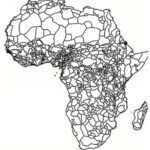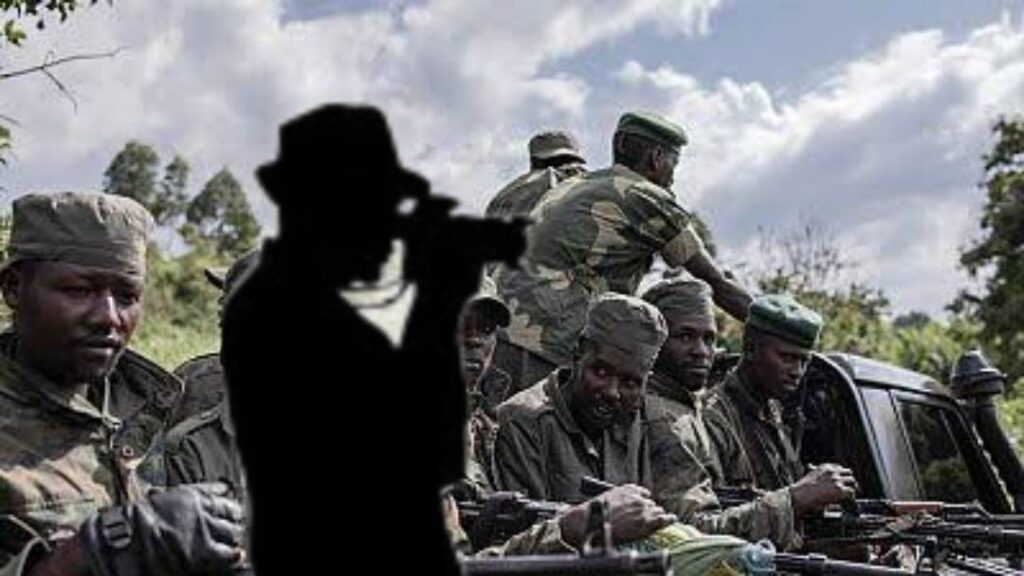Journalist based in Goma, working under a pseudonym because of threats by the government and M23 rebels
Arlette Bashizi/Reuters
Activists call for an end to the fighting between the M23 rebel group and the Congolese army at a demonstration in Goma, the largest city in eastern Democratic Republic of the Congo, on 19 February 2024.
The Congolese journalistic community – of which I have been a part for many years – has a code of ethics that is crystal clear on our professional obligations: “Treat all issues without bias and present controversial topics honestly,” it says.
I aspire to this principle every working day, yet it has become hard to follow in recent years as the conflict between our army and the Rwanda-back M23 rebel group has put massive pressure on local journalists to support one side of the war or the other.
The conflict parties and their cheerleaders regularly harass reporters, accusing us of either supporting Rwanda and the M23, or the Congolese government and its auxiliaries. The accusations can lead to our arrest, kidnapping, torture, and even death.
Last year, I was arrested while reporting a story about how the war – which has displaced over 1.5 million people at the latest count – was affecting Goma, the largest city in eastern Democratic Republic of the Congo, and my hometown.
Interviewees told me that Goma had become overly militarised and unsafe as the Congolese army, pro-government militias, and pro-government foreign mercenaries had all deployed in massive numbers, ostensibly to protect the city.
The content never aired, yet the mere collection of statements that were critical of the government was sufficient to justify my arrest once word of what I was doing reached a local police station.
Meanwhile, as freedom of the press has been eroded in regions controlled by the government, a similar situation is prevailing in areas that are currently under the control of the M23.
Paul, a journalist I know operating in an M23-held area, told me that he is obliged to promote rebel propaganda. He stayed put in his town when the rebels took over because he wanted to protect his family, belongings, and radio station.
“I send the M23 messages on the radio,” Paul told me, requesting his name be changed, as did all my sources in this article. “I fear the possibilities of reprisals from armed pro-Kinshasa groups, but I have no other choice.”
‘Are we journalists or propagandists?’
The M23 is led by Congolese Tutsis who say they are fighting because the Congolese government failed to implement a 2013 peace accord, and because Tutsis are at risk from local militias. Yet Rwanda is widely thought to be pulling the strings, using the group to further its interests in eastern DRC, where it’s keen to maintain influence.
The rebels have taken over large chunks of territory, sending hundreds of thousands of people into camps around the outskirts of Goma. The city had a pre-war population of around 1.5 million people, and there is fear that the rebels may try to seize it.
Amid this upheaval, I recall a Congolese government spokesperson visiting Goma in the early days of the conflict and asking the city’s many reporters to act as “patriotic journalists” that would serve the interests of the state.
A media regulator that is supposed to ensure press freedom in the country imposed a ban on disseminating information related to the M23 without reference to official sources.
I also recall an army spokesperson advising us to exclusively rely on communications from the military’s official services. They too called for “necessary patriotism”, reminding us that DRC has only “one army”.
In a note published in April, a media regulator that is supposed to ensure press freedom in the country imposed a ban on disseminating information related to the M23 without reference to official sources.
Emmanuel, a fellow journalist, denounced the decision when we discussed it recently. He said that this council, tasked with defending Congolese journalists, is complicit in suppressing press freedom.
“Since the beginning of this war, we hoped to work independently and objectively, but it is impossible with the new directives from the Congolese government,” Emmanuel said. “Are we journalists or propagandists?”
Arrested, threatened, silenced
All this pressure has put journalists in a bind. If we report incidents critical of the government, we are branded Kigali sympathisers and can be thrown into prison. Yet if we choose to stay silent, we risk losing our credibility, and our humanity.
There is plenty of criticism that should be made of the government, which has tried to halt the M23 advance by contracting the services of a patchwork of local militias collectively known as Wazalendo, which means ‘patriots’ in Swahili.
Members of civil society who I frequently speak with say the Wazalendo and Congolese soldiers are wreaking havoc on Goma and the displacement camps, killing people, stealing from them, and raping women on a regular basis.
When I went to report on this – performing my job of gauging people’s opinions on how government policies affect their lives – police officers accused me of disturbing the city’s peace and arrested me.
John, a colleague in Goma, told me he went into hiding in May after interviewing enraged civilians affected by an M23 bomb strike on a displacement camp in the city.
Before my eventual release, an officer threatened my life. “I know you are a reporter and that you are well known across the city, but I have a gun and I can kill you right now,” he told me. “Bear in mind that we are at war. I can do whatever I want with you.”
His words, and the time that I spent in custody, left a deep wound. I am not currently voicing personal or professional opinions about the war, though even that means I am seen as suspicious by some people.
I am not the only journalist to have gone through this. John, a colleague in Goma, told me he went into hiding in May after interviewing enraged civilians affected by an M23 bomb strike on a displacement camp in the city.
The displaced people condemned the practice of the Congolese army and its allies of placing defensive positions and heavy weapons dangerously close to the camp, which leaves inhabitants vulnerable to rebel bombardment.
“It is disheartening to see the government threatening us for doing our jobs,” John told me a week after he went into hiding. “I couldn’t even feel safe in my own home. I had to run because they want us to report what they want to hear.”
The situation for journalists is arguably even harder in M23-held areas. Paul, the reporter I mentioned before, said almost all his colleagues fled when the M23 arrived, while those who remained fear being called pro-Rwandan if the area changes hands.
Rose, a journalist I spoke to who is employed at a community radio station in a part of Rutshuru territory controlled by the rebels, said her programming has had to change significantly.
“We are no longer able to operate freely in this rebel-controlled zone,” she said. “As a precautionary measure, we have suspended certain programmes due to security concerns. Currently, we are primarily focusing on social programmes.”
David, a colleague and friend, said he had to flee his village of Kiwanja after rebels threatened him. He said they were angry because he had been documenting rebel atrocities against civilians in the surrounding area.
“I felt unsafe as heavy fighting was reported around Kiwanja,” David said. “I received threats from the M23 that I should prepare for the worst if they took over the entire village. I began my journey from my city and arrived in Goma.”
Familiar territory
While the M23 conflict has been especially polarising – leading to vicious online and offline information wars – journalists in DRC are used to ill-treatment by the government and by armed groups.
In 2019, I was beaten and severely injured while covering demonstrations criticising the policies of the government, which is led by President Félix Tshisekedi, who is now in his second term.
Journalist in Danger, a Congolese rights group, has reported 523 attacks on the press – including 160 arrests; 123 cases where media outlets were attacked, shut down, or had their broadcasts banned; and five journalists killed – under Tshisekedi’s rule.
I would also like to call on the conflict parties to recognise the importance of allowing journalists their neutrality.
Still, our current struggles feel existential and have forced me to question the future of our profession. For how long can we resist the pressure of giving up our independence and aligning with pro-government or pro-M23 narratives?
For now, my priority is the safety of myself and my family, some of whom are in Goma while others are in M23-controlled areas. But I would also like to call on the conflict parties to recognise the importance of allowing journalists their neutrality.
It is critical that we are seen by the public as beacons of truth, dedicated to reporting the facts. If the warring parties are looking for propagandists, they should hire somebody for that purpose and leave us journalists in peace.
This article was first published by the New Humanitarian:

